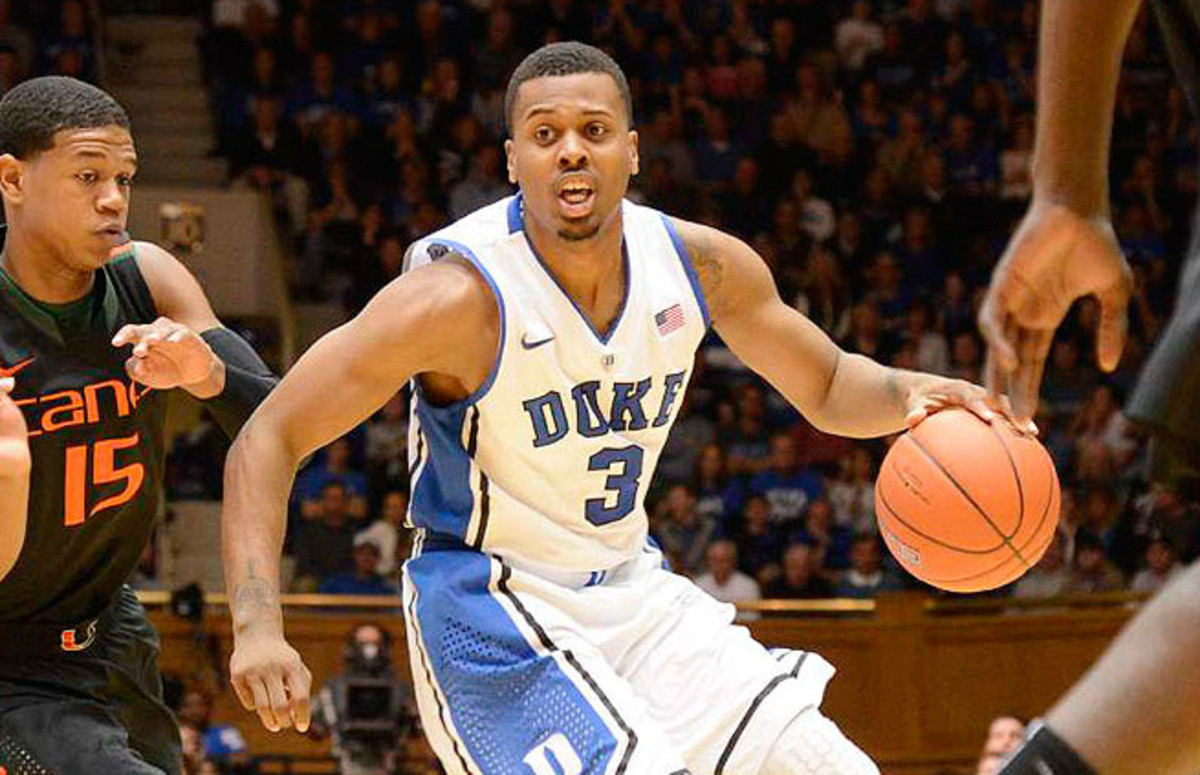SI College Athlete of the Year nominee: Duke's Tyler Thornton
They are both gifts from new friends, two fourth graders and one fifth grader at Durham's C.C. Spaulding Elementary, whom he met as part of a course he took last fall with Makeba Wilbourn, his academic advisor in Duke's psychology department. As part of his studies of the achievement gap often experienced in low-income households, Thornton accompanied Wilbourn to Spaulding, a school that draws most of its students from Durham public housing and where 97 percent of students receive free or reduced lunch. Through the school's SONS (Students Of New Success) program, Thornton was matched up with a trio of boys for a pair of short meetings. The boys, all capable students from homes without steady male role models, had struggled at times with behavioral issues; in the words of Sanders Tate Jr., the behavior specialist who runs SONS, "they needed that extra push."
In came Thornton, less as a Division I basketball player -- he averaged 3.6 points and 2.2 assists in 22.0 minutes per game as a junior on a team that reached the regional finals of the NCAA tournament -- and more as a successful young man with whom the boys could identify. They were apprehensive at first, one was too shy to even face Thornton, but the visitor soon won them over with talk of shared loves like sneakers and artwork, opening the door for lessons on the importance of academics (Thornton told the story of his mother benching him for a critical high school game after a disappointing exam score) and turning the other cheek (as he must do to hecklers during the Blue Devils' road games).
At the end of the meeting, Thornton proposed a 1-on-3 basketball game during his second visit -- if the boys did their schoolwork and behaved. With near-perfect marks on both counts, they earned the matchup ... and a resounding loss to their 6-foot-1 friend. "He was bumping them with his butt and knocking them down," says Wilbourn. "It was pure Tyler, and the boys were laughing and smiling." Afterward, when one of the boys said he felt like he was dreaming, Thornton had Wilbourn snap a photo so they would always have proof of the moment.
Thornton has kept tabs on the boys since his class ended in December, dropping by for a visit during spring break in March; this month he will host them and the rest of the SONS participants during a visit to Duke's campus. He's been proud to hear reports of the boys' across-the-board improvement both academically and behaviorally. Tate says that Thornton has been a "phenomenal instrument of inspiration" and tells the story of seeing one of the boys walk away from an instigator in the hallway, just as he'd seen Thornton do during an NCAA tournament game. "You can't save the world," says Thornton, "but if you make a difference in one person's life and can see that difference, there's no better feeling."
It's a feeling Thornton has grown familiar with, having worked at soup kitchens and a camp for developmentally disabled adults while attending Gonzaga College High in Washington, D.C. His work with SONS, along with his participation in the Read With Blue Devils program and in a program at the Duke Children's Hospital, helped land him on the inaugural NABC Good Works team.
But on the drive back from Spaulding after one of their visits, Thornton wasn't so sure he was making a difference. Overwhelmed by the boys' response, he told his professor that he felt he hadn't earned it.
"That's the thing about being a role model," Wilbourn told him. "If you get caught up in it and think you're worthy, you forget that's not for you to determine. That's for them. And they've already determined you are."





